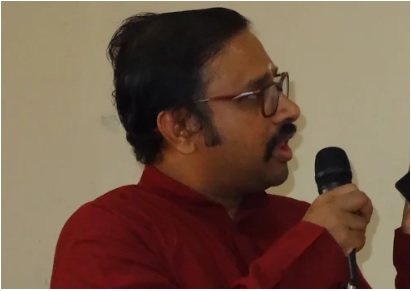Why Should We Read Mahabharata Part I – Civilisational Philosophy
Mahabharata the secret vault where many modern Civilisational instruments are shaped.
Mahabharata the secret vault where many modern Civilisational instruments are shaped.
The civilization of Bharatamandala nurtured many beautiful flowers in its Purushartha tree. In its quest to live the essence of Purushartha, it explored every way of realizing it. In its exploration, every time it encountered a slippery slope, it marked the path for us to walk with care. Where they found an opportunity for transformation, they left a gem glowing infinitely. It is for us to pick them up and repurpose them for future generations.
The story of Dharmavyadha and Kaushika in Vanaparva of Mahabharata covers some of the most fundamental truths of life
Sutradhar is a dramatized retelling of events, myths, and legends set across the arc of Indian history.
A Contemporary versions of Historical Works and Hindu Epics based on Creative Liberties in Bhartiya Literature
It is Markandeya, who narrates this episode to Yudhishthira. Through a myriad story, Markandeya presents an astonishing variety of perspectives covering multiple dimensions of life and immense balance. This is one story that all aspirants of knowledge and exalted worlds must always keep in mind.
Legend of Suheldev – The King Who Saved India by Amish. The tale of a magnificent 11th-century king, who united different Indians against the onslaught of invaders.
Sage Markandeya is an important person in the Vana Parva of Mahabharata. Every era needs a Markandeya – that quiet, calm sage full of Devotion, Tapas and Brahmacharya to enable to us see our Deluge and the Supreme in the midst of that Great Deluge.
Shuka’s journey represents a path a gradual evolution that one must minimally go through, even if one is born ready.
Sage Shuka was a garbha-shriman – one who was born a self-realized soul. Sage Shuka who narrates Srimad Bhagavata to King Pareekshit.
Sage Shuka, son of Sage Vyasa, is an important person in Mahabharata. It is Shuka who narrates Srimad Bhagavata to King Pareekshit. Moksha is a fascinating story in Mahabharata that elevates one to look at life with divine dispassion.
The larger goal of life must be renunciation and striving for Moksha. Nahusha rediscovers this emphasis for himself, eventually, in his conversation with Yudhishthira – in the discussion of who a genuine brahmana/sage is and the nature of the Parabrahma vastu. Thus, he sets himself firmly in the path of renunciation in the guidance he provides to the future that is Yudhishthira. Hence, he regains his divine form and the right to be back to the exalted worlds.
The story of the death of King Pareekshita is narrated in Adi Parva twice – once narrated by Sage Ugrashrava Souti to Shaunaka and once more by the ministers of Janamejaya to the king himself. This is a great story how our passion creates a prowess and the lust to demonstrate that prowess takes us in the wrong direction. The story goes thus.
In the Vanaparva, Sage Markandeya narrates fascinating stories to Yudhishthira – greatly philosophical and metaphoric, about the different forms of Agni.
The story of Astika, son of sage Jaratkaru and Jaratkaru – the sister of Vasuki, is upheld as a very auspicious one in the tradition. It marks the end of…

Shivakumar G V is 'Director - INDICA (Guru-Saadhaka Sachiva). His responsibilities focus on INDICA’s critical mission to cultivate leadership. He guides initiatives to serve Gurus, perpetuate their legacies, enable/empower leaders committed to IKS to become influential thinkers, institution builders and public leaders, and bolster the broader IKS ecosystem. Over the next 36 months, Shivakumar embarks on an ambitious pledge to honor and sustain the legacies of 108 Living and Past Gurus from the 20th Century. His efforts will focus on organizing, making accessible, and cultivating a parampara that highlights their significant contributions to our civilization. As an IKS Research Scholar, Shivakumar remains dedicated to his scholarly pursuits in Itihasa-Puranas and Indian Knowledge Systems. His work includes developing contemporary frameworks based on IKS principles, with a special focus on the Mahabharata and Purushartha. He has been a prolific contributor to INDICA Today, sharing his insights and knowledge with both academic and general audiences. He has delivered several story telling and courses on Mahabharata, Purushartha, Indic Civilization Studies for aspiring leaders and students. He is the curator of ‘Aryaa - An Anthology of Vedic Studies’ a collection of 10 stories on 10 Vedic Women by 10 Authors published by INDICA. Shivakumar holds an M.Tech in Computer Science from IIT Bombay and a B.E. from the National Institute of Technology, Surat. With 25 years of experience in the IT industry, his expertise spans theoretical computer science, algorithms, and learning system design. Shivakumar resides in Bengaluru with his family and is a devoted follower of the River-Goddess Saraswati.
